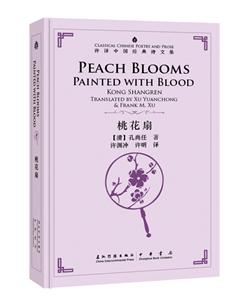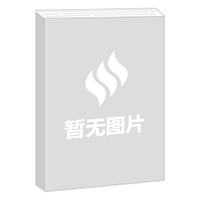-
>
百年孤獨(2025版)
-
>
易中天“品讀中國”系列(珍藏版全四冊)
-
>
心歸何處
-
>
(精裝)羅馬三巨頭
-
>
野菊花
-
>
梁啟超家書
-
>
我的父親母親:民國大家筆下的父母
桃花扇 版權信息
- ISBN:9787508540283
- 條形碼:9787508540283 ; 978-7-5085-4028-3
- 裝幀:一般輕型紙
- 冊數:暫無
- 重量:暫無
- 所屬分類:>
桃花扇 本書特色
叢書譯者為許淵沖先生,其從事翻譯工作70年,2010年12月榮獲“中國翻譯文化終身成就獎”;2014年8月榮獲由國際譯聯頒發的文學翻譯領域*獎項——“北極光”杰出文學翻譯獎,成為首位獲該獎的亞洲翻譯家。經許先生的妙手,許多中國經典詩文被譯成出色的英文韻語。這套漢英對照版“許譯中國經典詩文集”薈萃許先生*代表性的英文譯作14種,漢語部分采用中華書局版本。這些作品包括多種體裁,上起先秦,下至清代,既是聯接所有中國人思想、情感的文化紐帶,也是中國文化走向世界的重要橋梁。閱讀和了解這些作品,即可盡覽中國文化的“源頭活水”。相信這套許氏譯本能使英語讀者分享孔子、老子的智慧,分享唐詩、宋詞、中國古典戲曲的優美,并以此促進東西方文化的交流。2015年2月2日,由中國出版協會舉辦的第五屆中華優秀出版物獎在京揭曉, “許譯中國經典詩文集”(漢英對照)(14冊)榮獲“提名獎”。
桃花扇 內容簡介
叢書譯者為許淵沖先生,其從事翻譯工作70年,2010年12月榮獲“中國翻譯文化終身成就獎”;2014年8月榮獲由國際譯聯頒發的文學翻譯領域獎項——“北極光”杰出文學翻譯獎,成為首位獲該獎的亞洲翻譯家。 經許先生的妙手,許多中國經典詩文被譯成出色的英文韻語。這套漢英對照版“許譯中國經典詩文集”薈萃許先生具代表性的英文譯作14種,漢語部分采用中華書局版本。這些作品包括多種體裁,上起先秦,下至清代,既是聯接所有中國人思想、情感的文化紐帶,也是中國文化走向世界的重要橋梁。閱讀和了解這些作品,即可盡覽中國文化的“源頭活水”。相信這套許氏譯本能使英語讀者分享孔子、老子的智慧,分享唐詩、宋詞、中國古典戲曲的優美,并以此促進東西方文化的交流。 2015年2月2日,由中國出版協會舉辦的第五屆中華優秀出版物獎在京揭曉, “許譯中國經典詩文集”(漢英對照)(14冊)榮獲“提名獎”。 許淵沖--詩譯英法一人 ,北京大學教授,翻譯家。希望這套許氏譯本能使英語讀者對中國經典詩文也能“知之,好之,樂之”,能夠分享孔子、老子的智慧,分享唐詩、宋詞、中國古典戲曲的優美,并以此促進東西文化的交流。值得珍藏。許淵沖先生從事翻譯工作70年,2010年12月榮獲“中國翻譯文化終身成就獎”。他被稱為將中國詩詞譯成英法韻文的專家,經他的妙手,許多中國經典詩文被譯成出色的英文和法文韻語。這套“中國經典詩文集”就是由他所譯,前半部分是英文,后半部分是中文。 Ancient Chinese classic poems are exquisite works of art. As far as 2,000 years ago, Chinese poets composed the beautiful work Book of Poetry and Elegies of the South, Later, they created more splendid Tang poetry and Song lyrics. Such classic works as Thus Spoke the Master and Laws: Divine and Human were extremely significant in building and shaping the culture of the Chinese nation. These works are both a cultural bond linking the thoughts and affections of Chinese people and an important bridge for Chinese culture and the world. Mr. Xu Yuanchong has been engaged in translation for 70 years. In December 2010, he won the Lifetime Achievement Award in Translation conferred by the Translators Association of China (TAC). He is honored as the only expert who translates Chinese poems into both English and French. After his excellent interpretation, many Chinese classic poems have been further refined into perfect English and French rhymes. This collection of Classical Chinese Poetry and Prose gathers his most representative English translations. It includes the classic works Thus Spoke the Master, Laws: Divine and Human and dramas such as Romance of the Western Bower, Dream in Peony Pavilion, Love in Long-life Hall and Peach Blossom Painted with Blood. The largest part of the collection includes the translation of selected poems from different dynasties. The selection includes various types of poems, lyrics and Yuan, Ming and Qing dynasty songs. The selected works start from the pre-Qin era to the Qing Dynasty, covering almost the entire history of classic poems in China. Reading these works is like tasting "living water from the source" of Chinese culture. We hope this collection will help English readers "know, love and appreciate" Chinese classic poems, share the intelligence of Confucius and Lao Tzu, share the gracefulness of Tang Dynasty poems, Song lyrics and classic operas and songs and promote exchanges between Eastern and Western culture. This book is one of the 14 books of Classical Chinese Poetry and Prose, a translation of Confucian classics Thus Spoke the Master.
桃花扇 目錄
目 錄
Preface1
序
ACT I
**本
Beauty and Duty
一見鐘情結良緣
Scene 1 Visit to a Beauty
**出 訪翠
Scene 2 Wedding Night
第二出 眠香
Scene 3 Dowry Rejected
第三出 卻奩
ACT II
第二本
Word and Sword
一封書信阻刀兵
Scene 1 The Army
**出 撫兵
Scene 2 The Message
第二出 修札
Scene 3 The Camp Gate
第三出 投轅
ACT III
第三本
Crime and Succession
三罪阻立繼位人
Scene 1 Parting
**出 辭院
Scene 2 The Emperor’s Death
第二出 哭主
Scene 3 Succession to the Throne
第三出 阻奸
ACT IV
第四本
Persecution on Persecution
三番兩次逼香君
Scene 1 Refusa
**出 拒媒
Scene 2 Fragrant in Her Bower
第二出 守樓
Scene 3 The Fan
第三出 寄扇
ACT V
第五本
Songs and Tears
歌舞聲中花泣血
Scene 1 The Banquet
**出 罵筵
Scene 2 Selection of Songstresses
第二出 選優
Scene 3 Lee’s Bower Revisited
第三出 題畫
Scene 4 Epilogue
第四出 余韻
桃花扇 節選
Scene 3 The Camp Gate (Enter two soldiers.) First Soldier (Singing): Killing the foe, we take the things they leave; We occupy their houses but none grieve. Officers eat from the stores a great deal; Soldiers have from dawn till dusk their meal. Second Soldier: Now we do not sing like that. First Soldier: How do you sing now? Second Soldier (Singing): We can take nothing the foe leave; People’s empty houses make us grieve. Officers eat nothing from the store; Soldiers can have their meals no more. First Soldier: If what you sing is true, we poor soldiers would die of hunger. Second Soldier: That is almost true. First Soldier: Last time when we shouted for food supply, our general promised to station us around the food stores in the vicinity of the Southern Capital. But now days have passed without further information. Could our general have changed his mind? Second Soldier: If he changes his mind, we may raise another tumult. First Soldier: Do not talk about tumult. We had better go to the camp gate for the daily manoeuvre. Do not forget the punishment for violation of martial law is more terrible than hunger or even death. (Exeunt.) (Enter Liu Jingting with his baggage on the back.) 第三出 投 轅[1] (凈、副凈扮二卒上)(凈)殺賊拾賊囊,救民占民房,當官領官倉,一兵吃三糧。(副凈)如今不是這樣唱了。(凈)你唱來!(副凈)賊兇少棄囊,民逃剩空房,官窮不開倉,千兵無一糧。(凈)這等說,我們這窮兵當真要餓死了。(副凈)也差不多哩。(凈)前日鼓噪之時,元帥著忙,許俺們就糧南京,這幾日不見動靜,想又變卦了。(副凈)他變了卦,俺們依舊鼓噪,有何難哉。(凈)閑話少說,且到轅門點卯,再作商量。正是 “不怕餓殺,誰肯犯法”。(俱下) 【北新水令】(丑扮柳敬亭,背包裹上)走出了空林落葉響蕭蕭,一叢叢蘆花紅蓼。倒戴著接帽[2],橫跨著湛盧刀[3],白髯兒飄飄,誰認的詼諧玩世東方老[4]。 俺柳敬亭沖風冒雨,沿江行來,并不見亂兵搶糧,想是訛傳了。且喜已到武昌城外,不免在這草地下打開包裹,換了靴帽,好去投書。(坐地換靴帽介) 【南步步嬌】(副凈、凈上)曉雨城邊饑烏叫,來往荒煙道,軍營半里遙。(指介)風卷旌旗,鼓角縹緲,前面是轅門了,大家趲行幾步。餓腹好難熬,還點三八卯[5]。 (丑起拱介)兩位將爺,借問一聲,那是將軍轅門?(凈向副凈私語介)這個老兒是江北語音,不是逃兵,就是流賊。(副凈)何不收拾起來,詐他幾文,且買飯吃。(凈)妙!(副凈問介)你尋將軍衙門么?(丑)正是。(凈)待我送你去。(丟繩套住丑介)(丑)呵呀!怎么拿起我來了?(副凈)俺們是武昌營專管巡邏的弓兵,不拿你,拿誰呀。(丑推二凈倒地,指笑介)兩個沒眼色的花子,怪不得餓的東倒西歪的。(凈)你怎曉得我們挨餓。(丑)不為你們挨餓,我為何到此?(副凈)這等說來,你敢是解糧來的么?(丑)不是解糧的,是做甚的。(凈)啐!我們瞎眼了,快搬行李,送老哥轅門去。(副凈、凈同丑行介) 【北折桂令】(丑)你看城枕著江水滔滔,鸚鵡洲闊,黃鶴樓高[6]。雞犬寂寥,人煙慘淡,市井蕭條。都只把豺狼喂飽,好江城畫破圖拋。滿耳呼號,鼙鼓聲雄,鐵馬嘶驕。
桃花扇 作者簡介
許淵沖(1921—),江西南昌人,北京大學教授,翻譯家。早年在西南聯大師從錢鍾書先生,1941年入美國志愿空軍任英文翻譯,1948年留學法國巴黎大學,1950年底歸國。此后從事教學和文學翻譯達六十余年,譯作涵蓋中、英、法等語種,尤其在我國古詩英譯方面,形成以韻體譯詩的獨特風格,有“詩譯英法”之譽。錢鍾書先生看到他的《李白詩選》英譯本后評價說:“太白能通夷語……與君茍并世,必莫逆于心耳。”英國智慧女神出版社認為,他的《西廂記》英譯本“在藝術性和吸引力方面,可以和莎士比亞的《羅密歐與朱麗葉》相媲美。”足見其英文造詣及翻譯技巧在國人中實獨步當世。 有中、英、法譯著《詩經》《老子》《論語》《楚辭》《李白詩選》《西廂記》《紅與黑》《包法利夫人》《追憶似水年華》等世界名著六十余種。2001年曾獲諾貝爾文學獎提名;2014年榮獲國際翻譯界獎項“北極光”獎,系首位獲此殊榮的亞洲翻譯家。
- >
李白與唐代文化
- >
新文學天穹兩巨星--魯迅與胡適/紅燭學術叢書(紅燭學術叢書)
- >
煙與鏡
- >
我與地壇
- >
我從未如此眷戀人間
- >
伊索寓言-世界文學名著典藏-全譯本
- >
山海經
- >
詩經-先民的歌唱


















